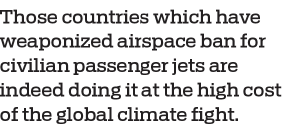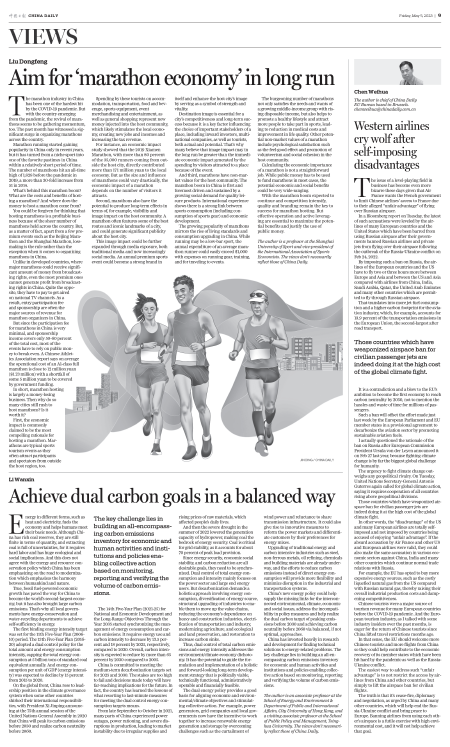
Chen Weihua

The issue of a level-playing field in business has become even more bizarre these days given that Air France wants the French government to limit Chinese airlines' access to France due to their alleged "unfair advantage" of flying over Russian airspace.
In a Bloomberg report on Tuesday, the latest of such accusations were leveled by the airlines of many European countries and the United States which have been barred from using Russian airspace after their governments banned Russian airlines and private jets from flying over their airspace following the outbreak of the Russia-Ukraine conflict on Feb 24, 2022.
By imposing such a ban on Russia, the airlines of the European countries and the US have to fly two or three hours more between Europe and Asia and between the US and Asia compared with airlines from China, India, Saudi Arabia, Qatar, the United Arab Emirates and many other countries which are permitted to fly through Russian airspace.
That translates into more jet fuel consumption and a higher carbon footprint for the aviation industry, which, for example, accounts for 13.9 percent of the transportation emissions in the European Union, the second-largest after road transport.
It is a contradiction and a blow to the EU's ambition to become the first economy to reach carbon neutrality by 2050, not to mention the hassles and waste of time for millions of passengers.
Such a ban will offset the effort made just last week by the European Parliament and EU member states in a provisional agreement to decarbonize the aviation sector by promoting sustainable aviation fuels.
I actually questioned the rationale of the ban on Russia after European Commission President Ursula von der Leyen announced it on Feb 27 last year, because fighting climate change is by far the biggest global challenge for humanity.
The urgency to fight climate change outweighs any geopolitical rivalry. On Tuesday, United Nations Secretary-General Antonio Guterres again called for global climate action, saying it requires cooperation of all countries rising above geopolitical divisions.
Those countries which have weaponized airspace ban for civilian passenger jets are indeed doing it at the high cost of the global climate fight.
In other words, the "disadvantage" of the US and many European airlines are totally self-imposed and not imposed by countries being accused of enjoying "unfair advantage". If the absurd accusation by Air France and other US and European airlines were valid, they could also make the same accusation in various economic sectors against China, India and many other countries which continue normal trade relations with Russia.
For example, the EU has opted to buy more expensive energy sources, such as the costly liquefied natural gas from the US compared with Russian natural gas, thereby raising their overall industrial production costs and dampening competitiveness.
Chinese tourists were a major source of tourism revenue for many European countries before the COVID-19 pandemic. And the European tourism industry, as I talked with some industry insiders over the past months, is eager for the return of Chinese tourists since China lifted travel restrictions months ago.
In that sense, the EU should welcome more Chinese tourists and more flights from China so they could help contribute to the economic recovery of its member states which have been hit hard by the pandemic as well as the Russia-Ukraine conflict.
The easiest way to address such "unfair advantage" is to not restrict the access by airlines from China and other countries, but simply to lift the airspace ban for civilian flights.
The truth is that it's cease-fire, diplomacy and negotiation, as urged by China and many other countries, which will help end the Russia-Ukraine conflict and bring peace to Europe. Banning airlines from using each other's airspace is a futile exercise with high environmental cost, and it will not help achieve that goal.
chenweihua@chinadaily.com.cn

